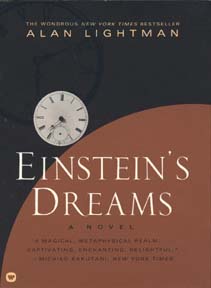Einstein’s Dreams
 Einstein’s Dreams by Alan Lightman was mentioned in Introvert Power. I read it in a day, but it will haunt me for much longer than that.
Einstein’s Dreams by Alan Lightman was mentioned in Introvert Power. I read it in a day, but it will haunt me for much longer than that.
But… what do I mean by “a day” and “longer”? After reading this little book, it’s impossible to use time references without a heightened awareness that my concept of time is quite specific, based on a complex of assumptions — but it could be imagined differently.
In Einstein’s Dreams, it is the spring of 1905. The young genius Albert Einstein has just completed “twenty crumpled pages, his new theory of time,” soon to be published in a German journal of physics. When we first meet him, it is early morning, and he is in a half-awake reverie in his office — fittingly, since we are about to plunge into his dream life of the previous two months, in which each night probes a different conception of time operating in his locale of Berne Switzerland.
He has settled on one theory as the most plausible, but each of the others is compelling in its own right. In one, time is sticky, and everyone remains caught in one moment while time flows on around them; in another, the world is about to end, and we see how this shared knowledge affects human activity and relations; in another, time is circular; in another, there is no past; in another, there is no future. And so on, for two months worth of dreams. Each Berne is unique, and each is situated, paradoxically, in a particular dream on a particular night in a particular mind.
Lightman, who teaches physics and writing at M.I.T., probes the relationships between time and space, body, mind, and psychology. I suppose the book could be compared to peeling an onion, examining each layer — each possible theory of time and its implications — in isolation. Lightman writes with the clarity and simplicity of a poet, deftly sketching out the few suggestive details of each potential world unfolding in Berne. But the truth is that we reflect aspects of every layer in our experience of life. Reading Einstein’s Dreams, we have a sense that the real Berne, like our real consciousness, is a multifaceted place. We also gain an appreciation for the richness of our time-sense, which we often hear referred to as “timebound,” but in which we really live in many times at once. It’s an absolutely ingenius book.
I’ve noticed that as a Christian, my understanding of eternity is reflexively linear. I’m always having to make mental corrections: “God is not simply longer than the longest timeline, but rather outside of time altogether.” It has a real bearing on how we pray and live. But my mind isn’t able to pursue the implications very far, other than to imagine that somehow all times are together — past, present, and future always occurring. Reading the dreams of Daniel or the apostle John, this means that they aren’t simply forecasting something yet to unfold in earthly time, but describing something already occurring in eternity. Somehow. Now that I’ve read it once, Einstein’s Dreams will be fascinating to reread and ponder again in the light of such questions.
There is an exhilaration in reading a novel like this. It appeals to the writer in me — a writer not yet unbound and purposeful, but in there somewhere. I think it’s because of its absolute uniqueness. All the great books begin with a strange dream of some sort — a revelation that seems perhaps not to fit anywhere, but that is in fact a new or original way of seeing something important. The plot of Einstein’s Dreams is utterly unique; this is not one of those books you read thinking, “Alan Lightman wrote my book.” No one else would have written it. It’s proof that some completely personal ray of inspiration can be given powerful shape and form and sent into the world to touch and influence other minds. There is something arresting and wonderful about that.



2 Comments
Alice@Supratentorial
This one sounds fascinating. Thanks for the review!
Michelle @ 1morechapter
This is a favorite of mine. Glad you liked it!!